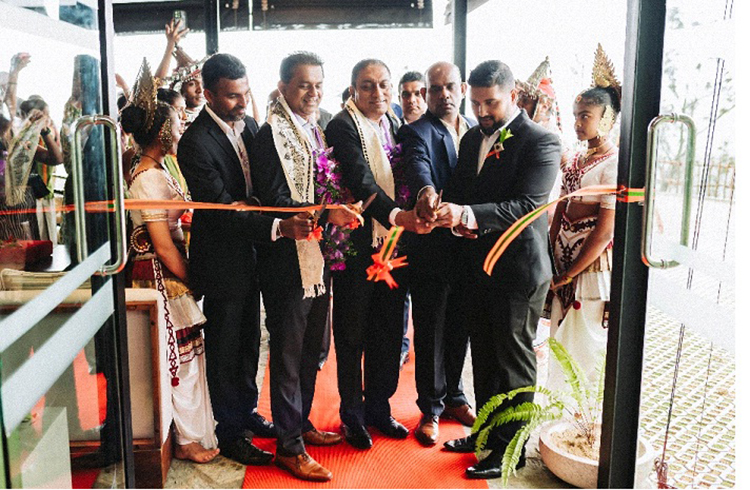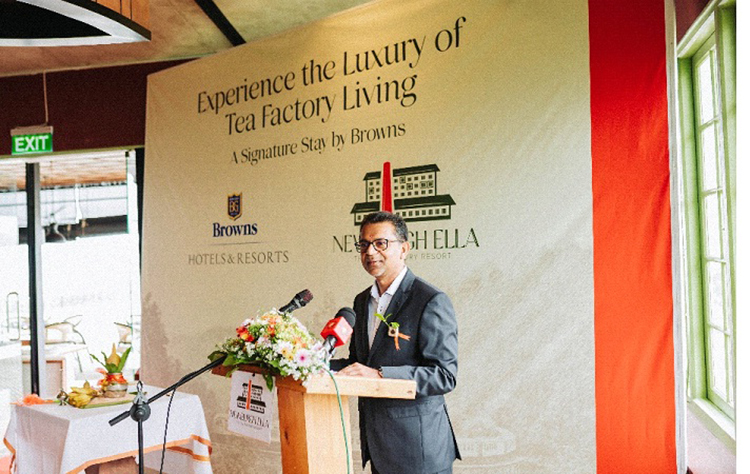Business
CSE crossings in Cargills, Expolanka and TJ Lanka

By Hiran H.Senewiratne
So far more than a Rs. 30 billion foreign outflow has been reported from the CSE, while last year the foreign outflow was Rs. 48 billion, stock market analysts said.
On the other hand, CNBC (Singapore) quoting a JPMorgan strategist report said that the best time to buy Asian stocks could be now.
Mixo Das, Asia equity strategist at the bank said US markets have been hitting record levels while Europe and Japan are approaching their all-time highs. However, Asian markets have not seen the same trend.
“Ever since the highs in February, we’re down quite a bit in Asian equities and the way we look at it is, our framework is telling us that now is probably the best time to be taking risks in Asia,” he told CNBC recently.
The report said that investor positioning in Asia is currently “extremely light” while valuations have come down to more normal levels. If macroeconomic momentum in the region starts to stabilise, Asia stocks could move a lot higher, the report revealed.
Amids those developments, both CSE indices showed downward trend yesterday. All Share Price Index went down by 19.50 points and S and P SL20 went down by 1.05 points. It is said that the LOLC Development Finance share price which depreciated by Rs. 22 or five percent had contributed 16 negative points to the All Share Price Index. Another reason for the index to become negative was that JKH, Browns Investments, LOLC and several other high profile companies’ had notable profit taking, which triggered selling pressure on their stocks during the day, market analysts said.
Turnover stood at Rs 3.08 billion with three crossings. Those crossings reported in Cargills, which crossed 3.72 million shares to the tune of Rs. 930.2 million, its shares traded at Rs. 250, Expolanka one million shares crossed for Rs. 54.9, its shares traded at Rs 54.90 and TJLanka 500,000 shares crossed for Rs. 20.5 million, its shares traded at Rs. 41.
In the retail market top five companies that mainly contributed to the turnover were Expolanka Rs 451.7 million (8.4 million shares traded), Singer (Sri Lanka) Rs 152.5 million (8.2 million shares traded), TJLanka Rs 121.4 million (2.95 million shares traded), LOLC Rs 105 million (246,000 shares traded), RIL Properties Rs. 73 million (9.3 million shares traded). It is also said that there was a foreign outflow of around Rs. 930.2 million. During the day 219.1 million share volumes changed hands in 24546 transactions.
Meanwhile, Hatton National Bank’s (HNB) Rs. 7 billion BASEL III compliant listed debenture issue was oversubscribed on its official opening day. HNB said, as per the prospectus, the issue closed following oversubscription.
The bank issued 50 million BASEL III compliant-Tier 2, listed, rated, unsecured, subordinated, redeemable debentures with a non-viability conversion at Rs. 100 each to raise Rs. 5 billion and offered a further 20 million debentures to raise Rs. 2 billion in the event of an oversubscription of the initial amount. The debentures carry a fixed rate of 9.50 percent payable annually. Joint managers and placement agents were Acuity Partners Ltd. and Capital Alliance Partners Ltd., respectively.
Business
Sri Lanka’s 2.3% inflation is a useful macro indicator, but it acts as a veil, says analyst

Disconnect between national statistics and household sentiment illustrated
Although official data points to a stable headline inflation rate of 2.3%, an independent economic analyst told The Island Financial Review that the public should look beyond this single figure.
Speaking on condition of anonymity, the analyst said, “That 2.3% is a crucial macroeconomic indicator for policymakers, but for the average household, it acts more like a veil. It obscures the sharply different economic realities in different sectors of the economy and, consequently, in different people’s lives.”
“You see, the aggregate is an average, a blend of everything from falling transport costs to soaring medical bills. But no family buys the ‘average’ basket. Your personal inflation rate is dictated by your unique spending pattern, and right now, those patterns are creating winners and losers in a low-inflation environment.”
He illustrated this by taking three contrasting Sri Lankan households.
“Consider a retired couple: their budget is dominated by healthcare, which is inflating at 4.2%, and perhaps occasional treats at restaurants, up 4.0%. For them, the cost of living is rising nearly twice as fast as the headline suggests. That 2.3% figure is of poor comfort to them.”
“Conversely, take a young professional who commutes; they are a direct beneficiary of the 0.9% deflation in transport. Their major expenses – fuel and vehicle maintenance – are supposed to be getting cheaper. Even if education inflation is high, it doesn’t affect them. This individual might feel almost no pinch, experiencing a personal inflation rate of about 1%. The headline number overstates their hardship.”
The analyst expressed his deepest concern for the typical family. “This is where the veil is most dangerous,” he said. “A family with school-going children is hit from multiple sides: Education at 3.9%, daily groceries at 3.3%, and clothing at 3.6%. The slight relief from cheaper transport is negligible against these heavy, non-negotiable expenses. Their budget is being squeezed relentlessly, a pressure the calm 2.3% aggregate completely masks.”
The analyst concluded that this sectoral divergence explains the disconnect between national statistics and household sentiment.
“When people hear ‘inflation is low and stable,’ but feel their wallet straining, it’s not ignorance. It’s because their personal basket is heavy with the sectors that are heating up – essential services, education, and food. The 2.3% is a useful indicator for the economy at large, but it should not blind us to the fact that many families are experiencing a much harder personal financial reality. Lifting that veil is key to understanding the true cost of living.”
by Sanath Nanayakkare
Business
Sri Lanka explores climate finance after Cyclone Ditwah

SLYCAN Trust convenes key forum on loss and damage funding
As Sri Lanka seeks funds as a climate-vulnerable nation, SLYCAN Trust convened a High-Level Forum on Climate Finance and Climate-Related Extreme Events in Colombo on January 20, 2026. The forum focused on improving access to finance for recovery and resilience, particularly following the severe impacts of Cyclone Ditwah in late 2025.
Dennis Mombauer, Director of Research and Knowledge Management at SLYCAN Trust, emphasised the urgency of building long-term resilience and addressing loss and damage.
“This Forum convenes key actors to identify pathways for accessing finance and managing climate risks,” he stated.
In a virtual keynote, Mathilde Laurans, Deputy Executive Director of the Fund for Responding to Loss and Damage (FRLD), announced that the fund opened its first call for proposals on December 15, 2025, with submissions accepted until June 15, 2026. “This milestone means that countries like Sri Lanka can now engage with us for support,” she said.
K.K.A. Chamani Kumarasinghe, Additional Director at Sri Lanka’s Climate Change Secretariat, highlighted the extensive damage caused by Cyclone Ditwah and stressed the need to strengthen response systems. She commended SLYCAN Trust for creating platforms that connect global climate processes with national priorities.
The forum included panel discussions with representatives from international climate finance institutions and technical experts, focusing on practical steps to enhance Sri Lanka’s climate resilience and improve local-level access to finance.
Business
Browns Hotels & Resorts brings a century of tea heritage to life at Newburgh Ella

In the mist-veiled heart of Sri Lanka’s hill country, where Ella has earned global recognition as one of the island’s most photographed destinations, Browns Hotels & Resorts introduces a new chapter in experiential hospitality with Newburgh Ella – The Tea Factory Resort. Once a working tea factory, the century-old estate, originally established in 1903 by the legendary Scottish tea planter George Thomson, has been carefully transformed into a luxury resort, preserving its industrial character and historical soul while elevating it into an immersive experience. Set against dramatic mountain backdrops and defined by its iconic orange chimney, the resort commands world-famous views of the Ella Gap, framed by Ella Rock and Little Adam’s Peak — where landscape, legacy, and luxury converge.
On 30 January 2026, Newburgh Ella officially opened its doors to travellers from around the world with a ceremonial launch attended by Eksath Wijeratne, CEO of Browns Hotels & Resorts; Gangadaran Velsamy, General Manager of Newburgh Ella; Priyal Perera, Head of Projects and Procurement; Nishad Rajapakse, Manager – Engineering; along with key officials from Browns Hotels & Resorts. The event featured traditional regional performances and a ceremonial presentation of the first keycards to Newburgh Ella’s inaugural guests by the resort staff.
This unveiling marks the soft opening of Newburgh Ella, with the property currently progressing through its LEED and green certification processes. As part of its sustainability journey, the resort operates on a fully paperless concept, with digital check-in and digital menu systems in place, reinforcing Browns Hotels & Resorts’ commitment to responsible and future-ready hospitality.
Located on the Ella–Passara main road, near the Nine Arch Bridge and Pekoe Trail, Newburgh Ella features 41 thoughtfully designed rooms, categorised as Silver, Gold, and Bronze — inspired by the hierarchy of tea tips. The resort includes special family rooms, exquisite suites, and full wheelchair accessibility, offering inclusivity without compromise. Guests can witness sunrises and sunsets unfold directly from their rooms, framed by emerald vistas, connecting them to the rhythm of the hills.
Dining at Newburgh Ella celebrates the estate’s relationship with tea, land, and craft. 1903 – The Dining Room offers all-day dining with local and international flavours. Eastern Valley, an open-air restaurant, presents Pan-Asian cuisine, while Three Tips, the tea lounge, invites guests to savour the estate’s finest teas. The resort’s bar, George Thomson – The Founder’s Tavern, features specially curated beverage menus inspired by the region, reflecting the warmth of Browns hospitality. Together, these experiences offer the luxury of tea factory living, blending heritage, craft, and modern comfort.
Beyond its spaces, guests can explore Ella through curated experiences — from estate walks and visits to Ravana and Diyaluma Falls to scenic railway journeys. SKY, the resort’s observation deck, offers breathtaking vistas over tea-carpeted valleys and the world-famous Ella Gap.
Commenting on the launch, Eksath Wijeratne, CEO of Browns Hotels & Resorts, said:
“Tea is one of Sri Lanka’s most powerful global stories, and with Newburgh Ella, we wanted to honour that legacy while creating an experience that goes beyond aesthetics. Guests can connect with the very process, the people, and the land that give Sri Lanka tea its global recognition. At the same time, this project supports the local community, with many former factory staff now part of the resort team, ensuring heritage, sustainability, and hospitality thrive together.”
With the unveiling of Newburgh Ella – The Tea Factory Resort, Browns Hotels & Resorts continues to expand its portfolio of story-led destinations across Sri Lanka, inviting travelers to experience tea country differently — where the finest grade of tea meets the finest grade of stay, steeped in history, character, and heart.
- A Gold Tip Room at Newburgh Ella with a private balcony
- Eksath Wijerathne, Chief Executive Officer with Priyal Perera, Head of Projects and Procurement with Gangadaran Welasamy unveiling the property signage for Newburgh Ella
- Eksath Wijerathne, Chief Exceutive Officer of Browns Hotels and Resorts addressing the gathering
- An aerial view of Newburgh Ella – The Tea Factory Resort set against the hills of Ella
- A Silver Tip Room with the iconic Orange Chimney and the scenic Ella Gap in the background
-

 Business5 days ago
Business5 days agoClimate risks, poverty, and recovery financing in focus at CEPA policy panel
-

 Opinion4 days ago
Opinion4 days agoSri Lanka, the Stars,and statesmen
-

 Business3 days ago
Business3 days agoHayleys Mobility ushering in a new era of premium sustainable mobility
-

 Business3 days ago
Business3 days agoAdvice Lab unveils new 13,000+ sqft office, marking major expansion in financial services BPO to Australia
-

 Business3 days ago
Business3 days agoArpico NextGen Mattress gains recognition for innovation
-

 Business2 days ago
Business2 days agoAltair issues over 100+ title deeds post ownership change
-

 Business2 days ago
Business2 days agoSri Lanka opens first country pavilion at London exhibition
-

 Editorial3 days ago
Editorial3 days agoGovt. provoking TUs


















